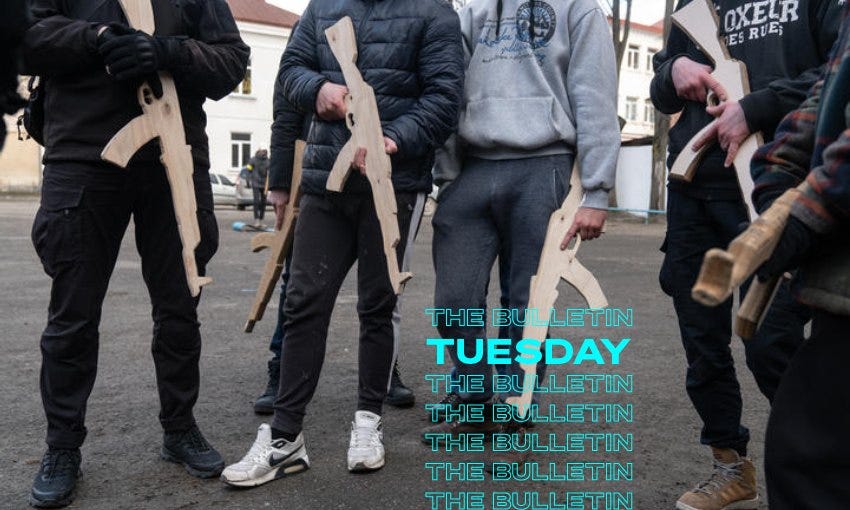New Zealand sends military aid to Ukraine
Defence Force to provide non-lethal military equipment, government to fund Nato purchases
Mōrena and welcome to The Bulletin for Tuesday, March 22, by Justin Giovannetti. Presented in partnership with Z Energy.
In today’s edition: Mental health crisis for children; Auckland experiences near record rains; report warns of literacy crisis; but first, the New Zealand helps Ukraine fight.
A basic military training session on February 28, 2022 in Ukraine. (RNZ/Getty Images)
In a significant shift, the Defence Force is now sending non-lethal aid to Ukraine.
For the first three weeks after Russia invaded Ukraine the New Zealand government’s approach to the conflict had been solely humanitarian. Along with limited sanctions and travel bans, the Beehive had written cheques worth $6 million to help the millions of refugees fleeing their homes. As Stuff reports, there’s been a big change in the last 24 hours. The Defence Force is now shipping body armour, helmets and camouflage vests from its stockpile to Ukraine’s military. Aotearoa is also sending $5 million to the Nato military alliance, to help it purchase war fighting gear, including fuel, communications equipment and medical supplies.
The decision follows a call on the weekend between Jacinda Ardern and Ukraine’s prime minister.
Ardern said that Denys Shmyhal, her Ukrainian counterpart, was “astounding” when the two spoke about the worsening situation in his country. While he hasn’t had as much international exposure as president Volodymyr Zelenskiy, Ardern said that Shmyhal thanked New Zealand for its help and was “absolutely focused” on the challenge he now faces. As RNZ reports, the Ukrainians did request weapons and Ardern did not rule out the request in the future.
The bigger challenge is that New Zealand doesn’t have many of the weapons Ukraine needs.
The chief of defence told reporters at parliament that he’d briefed the Ukrainian military on the weapons available in New Zealand’s inventory. The Ukrainians concluded that Aotearoa’s stock of modern missiles is so small that it wasn’t worth the bother of shipping them around the world. “We need a lot more than that,” air marshal Kevin Short recalled the Ukrainians responding. The backlog on orders of new anti-tank and anti-aircraft missiles is now three years long, so purchasing them isn’t an option either.
Russian bombardment of Ukraine’s cities has intensified as its military struggles.
Thursday will mark a month since the start of Russia’s invasion of Ukraine and while the Russian army is still slowly advancing, the costs have been enormous. Casualties on both sides have been in the thousands, while Ukraine’s largest cities have faced growing bombardment. Global economic sanctions have strangled Russia’s economy, but the country’s leaders have shown little interest in calling off the invasion. Reuters reports that a call for Ukraine to surrender the port city of Mariupol, or face an attack on its civilian population, has been rejected. Russia now warns of a coming human “catastrophe” from its planned attack. Much of this war revolves around Russian president Vladimir Putin. His actions have stumped many Kremlinologists. The Guardian spoke with five leading thinkers on Russia to better understand the president.
The generous support of our members powers all of The Spinoff's journalism, including live updates, the award-winning collaborations between Toby Morris and Siouxsie Wiles, and richly reported feature writing.
As we continue to struggle against commercial headwinds, contributions from our members are more critical than ever. If you value what we do and have the means to do so, please make a donation today and support our mahi.
Doctors fear mental health crisis for children, worsened by Covid.
Years-long underfunding of the country’s mental health system now means all hospitals in New Zealand face significant shortages of clinical mental health staff. Bridie Witton reports for Stuff that Wellington hospitals are missing 40% of full time stuff as demand surges for child and adolescent mental health services. The country’s mental health systems were under stress before Covid-19, but the pandemic has worsened nearly all aspects of the situations. Reported cases of self-harm are up and some doctors warn that things have gotten out of hand.
The Spinoff’s Covid data tracker has the latest figures.
Auckland experienced some of its heaviest rain on record.
In a single hour yesterday morning, 76.8mm of rain fell on Tāmaki Makaurau in the heaviest downpour in a half century. There were also more than 4,000 lightning strikes, including one that played havoc on Auckland’s radio stations. Stewart Sowman-Lund writes for The Spinoff about the flooding seen across the city. Auckland Zoo also announced it had to close its gates for the rest of the day for a “full clean-up”. Further south, Mount Ruapehu has started shaking. RNZ reports that the volcano’s alert level has been raised to two. Geonet has warned of an increased risk of eruption as pressure builds underground.
Fonterra pulls out of Russia, ending 40 years of butter exports.
It was an inevitable decision after international sanctions made trading with Russia, and getting paid, nearly impossible. After suspending shipments last month, Fonterra is now closing down its operations in Russia and withdrawing from a joint-venture. Russia made up about 1% of Fonterra’s business, according to Interest, and exiting the country will cost the co-op less than $10 million. Dairy prices are high, demand is high and production is down in New Zealand. There shouldn’t be much of an impact on the bottom line for producers.
From our partners at Spark: After an extended summer break, The Spinoff and partners Spark Lab are proud to announce the return of award-winning podcast Business is Boring. Join host Simon Pound as he talks to everyone from accidental entrepreneurs to industry leaders about their business journeys. In this new season, you can expect more inspiring entrepreneurs, returning guests and stories of struggle, success and determination. In the first episode, we welcome back Sharesies co-founder and CEO Brooke Roberts, whose company has grown from 2,000 users to over 500,000 since we last spoke to her on Business is Boring back in 2017. (Sponsored)
New report warns of literacy crisis in education.
One in five 15-year-olds aren’t meeting the country’s lowest benchmark for reading and 20% more are at the most basic level. It’s one of the stark findings in a recent report on New Zealand’s reading and writing skills. As RNZ reports, the reasons for the low literacy aren’t well understood and more research is needed. It's likely that chronic absenteeism (only 57% of students maintained regular attendance in 2019), institutional racism and underfunding for struggling students are contributing factors.
Waikato mourns after four dead in fishing tragedy.
The fishing vessel Enchanter sank just before midnight on Sunday in a storm off North Cape. Five people were rescued and four bodies have been recovered, including that of Te Awamutu builder Mark Sanders. Stuff reports that he called his family on Sunday evening and said he was having a “ball of a time” but the sea was getting rough. Cambridge publican Richard Bright was also among the dead. His wife Brenda opened their Group One Turf Bar yesterday and welcomed mourners. A rogue wave is believed to have hit the vessel.
Got some feedback about The Bulletin, or anything in the news? Get in touch with me at thebulletin@thespinoff.co.nz
Dylan Reeve explains how dipping a toe into online “Covid truth” can lead to a very deep pool of conspiracy. Airana Ngarewa writes that learning our history is painful for Māori and the new curriculum will be no different. Annabelle Parata Vaughan explores covid and street parties as a student in 2022. Felix Walton argues that now is the time to think seriously about an e-bike. Tara Ward tells you all you need to know about new channels Eden and Rush.
Rugby’s centre of gravity shifts to the northern hemisphere.
There were empty stadiums and lacklustre play in Super Rugby over the weekend, while Six Nations finished a climactic series in front of packed crowds across Europe. RNZ reports that France is now the global benchmark for rugby, with a convincing win against England. They also demolished the All Blacks last year—a sentence that brings me no joy to write. I highly recommend watching the Italian commentary from the final minutes of that country’s win over Wales.















If reading is weak all language markers are weak. Teaching reading means the teacher needs to BE a reader, understand the importance of vocabulary extension and how sentences are constructed. Many teachers fall below the levels of need. Also it is one of the biggest preparation subject for teachers and, apart from mathematics, the one that requires most understanding of the process of learning and monitoring...it needs to be taught as closely as possible in small groups or one to one. It is not taught just by osmosis, which is what they seem to be hoping for. Every day they should read aloud , and silently, read to another , and listen to a reading ; and very day they should write and learn some new vocabulary.
I fully endorse the condemnation of the standards. I taught at the very sensitive level of 8-10 year-olds . Tell a boy in those age groups that he is not up to standard and most times he will throw in the sponge...boys are difficult to turn into readers anyway.
Language needs to be at the base of all teaching in all subjects. Even keeping a daily diary is going to improve language . Reading is essential to developing breadth of language ability.
National Standards were in force from 2009 to 2018. They included very narrow and rigid literacy standards and many of today's 15 year olds would have been told at an early age that they were 'below standard'. No wonder they were turned off teaching and learning.